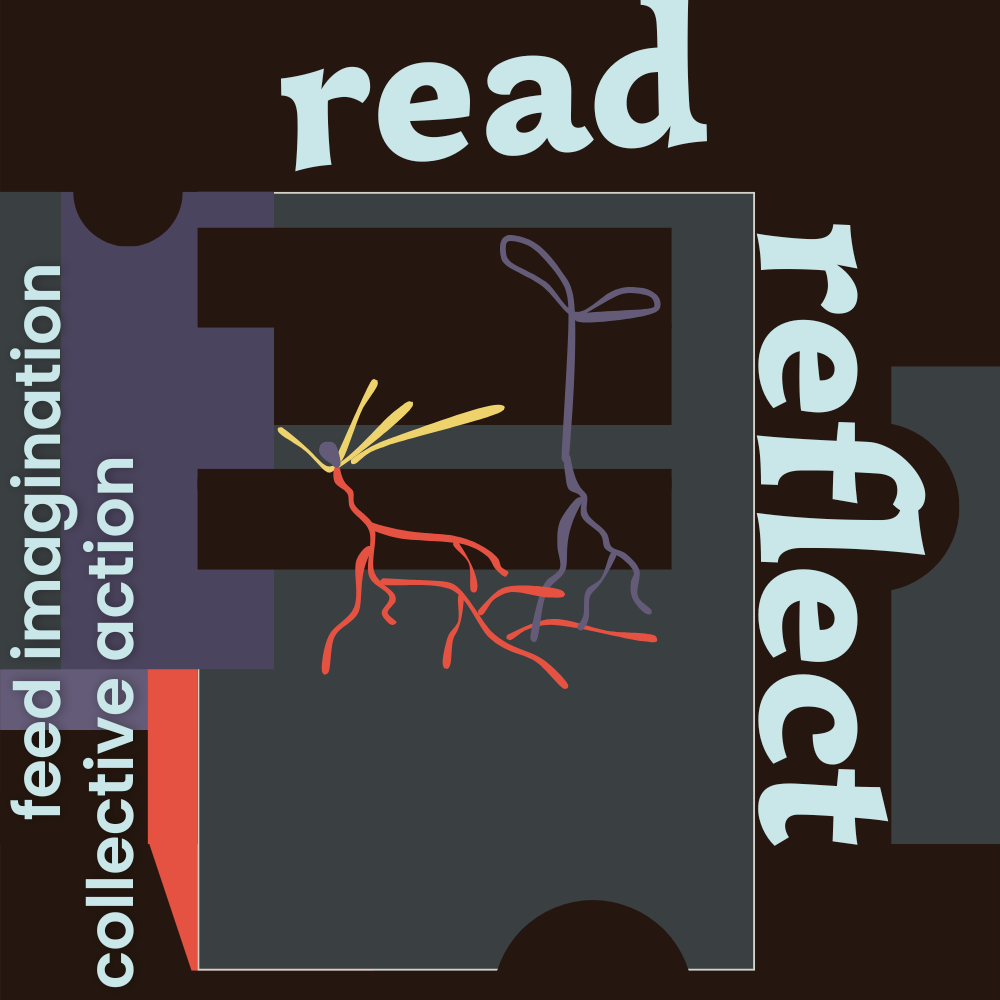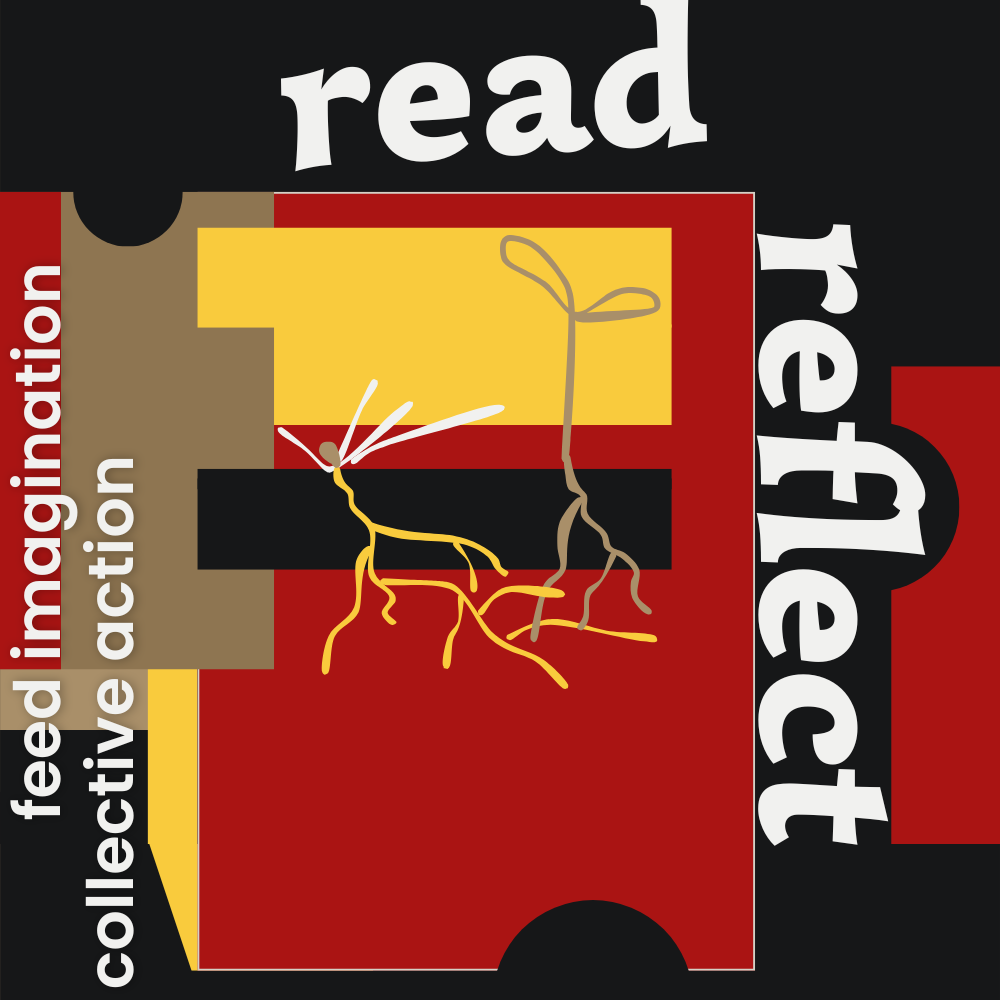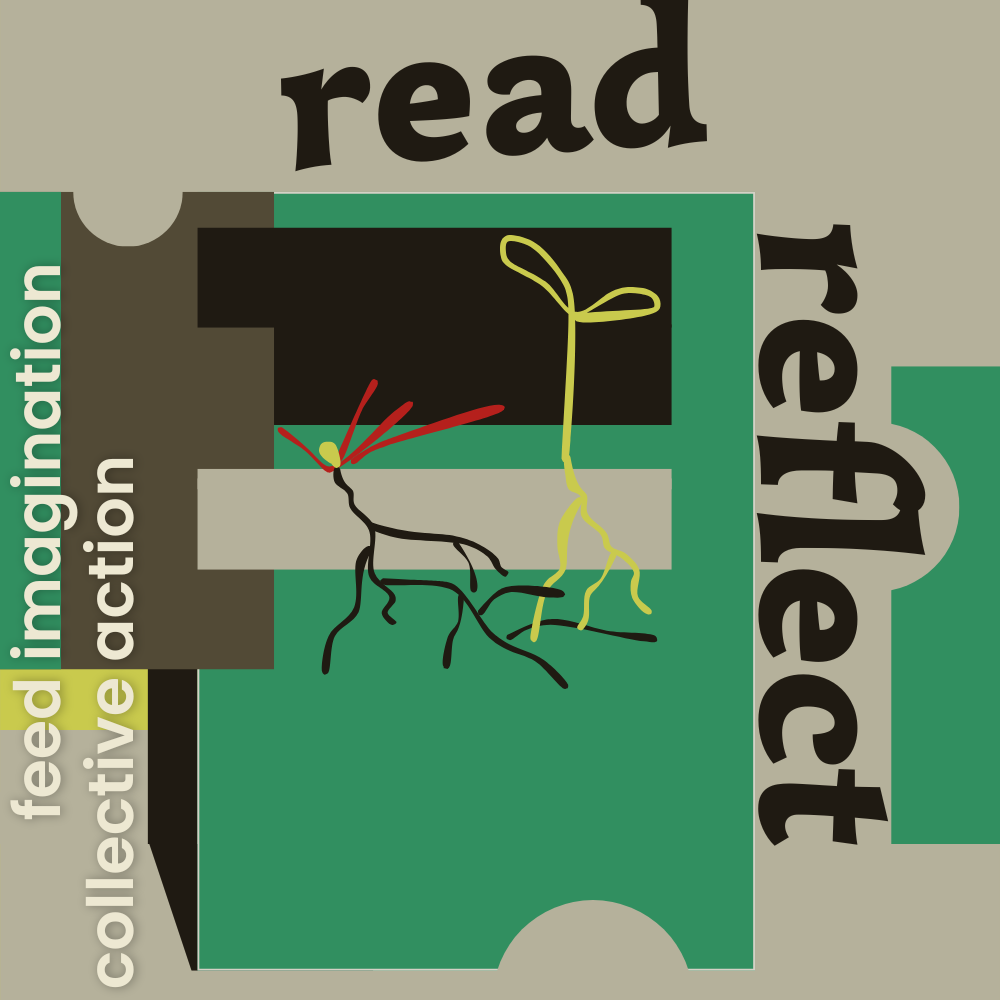water, and ways it is used to obstruct flow of life
Reflections on some of the ways water is (mis/ab)used by people w/power to harm people & communities that are Black, Indigenous, and/or part of the global majority in the past, present, and/or future.
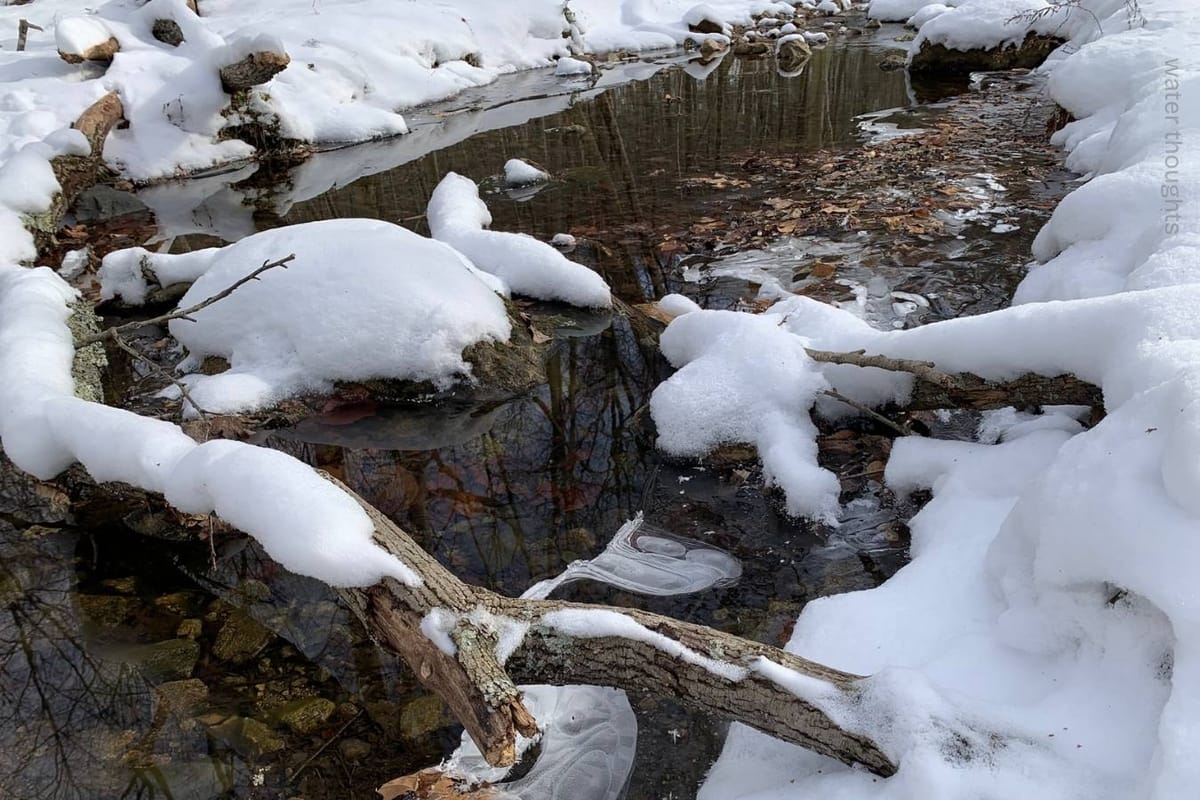
reflections and water
Why water? Why relevant? Because I was trying to talk about water. And when sometimes you look in the water, something else becomes visible. Here, it is trees, which aren't otherwise visible in the photo. I'm thinking about the archive, what isn't there, what is found, and what is imagined to give depth to what is known. I have deep gratitude to all those who share what they can, and one day I'll be able to write about that differently.
While I was reflecting on water, who has access to it and who doesn’t, and I continued to think about water, I couldn’t help but think about many aspects of it. I hope one day to write more, perhaps of ice, and groundwater, and water flow within ice, but for me it’s also ok if I never return to that. I’ve always been much more interested in humanity, and that humanity needs access to clean water to survive, and too many people, businesses, and countries hoard it, while creating the very conditions that make it more difficult to survive.
When I setup the reading challenge and it went live, almost a month ago, it had been a very large project for me, and as I began to describe why it’s named what it is, I couldn’t stop thinking about the role of water. I really didn’t want to stop writing about water.
Water is important to life, and it can also be abused, misused, or withheld to take away life. In this post, I’m focusing on the latter, the way it’s used to harm people. In another post, I’ll try to share some of the reflections I wrote on how water gives life.
I couldn’t stop thinking about how people with power interact with water—water itself, its flow, or using it as a means of travel—in ways that disproportionately obstruct the flow of life and harm communities that are Black, Indigenous, and/or part of the global majority in the past, present, and/or future.
In the intervening period since I wrote most of this post, I started reading Christina Sharpe's In the Wake. I am deeply grateful that this book exists, and it feels very connected to two of the reading challenge categories related to this post, included below.
Book: impacts of people w/power interacting w/water in a way that obstructs the flow of life
This category offers a way to select a book that enables reflection on how people with power interact with water—water itself, its flow, or using it as a means of travel—in ways that disproportionately obstruct the flow of life and harm communities that are Black, Indigenous, and/or part of the global majority, in the past, present, and/or future. The book can be fiction or nonfiction.
If you aren’t sure what fits or why, try this:
- Find a book you want to read that may or may not fit in any other category, but is connected to the overall theme of this challenge, then think about how it might be related to this topic. That reflection is the connection to this topic. Would it help to write about it or discuss with another person? Or both?
- It could be about anything that is connected to the long-lasting impacts of past and present actions of “people w/power interacting w/water in a way that obstructs the flow of life” that creates the destabilization of a place, people, animals, land, water, ice, etc.
- For example, past colonization, changing in gender roles, continued administration of a country connected to the prior colonizing country, enabling human-caused climate change, conflict resulting from destabilization, etc).
Book about slavery or the afterlife of slavery by an author who is Black, Indigenous and/or part of the global majority
The book can be fiction or nonfiction.
More background is in Saidiya Hartman’s preface to the 25th anniversary edition of Scenes of Subjection, a version of which was published on NY Books in 2022, called “The Hold of Slavery”.
This category includes all places and structures in which the hold of slavery continues to have a grip, including the continued destabilization of the African continent, and the expansion of cop cities, militarized policing, prisons, detention facilities, and more.
What is in this post are reflections from where I started, which was connected to many of my own experiences, and what I was reading then and had read.
Related to reading, I hadn’t yet started In the Wake, but I had been reading Antiblackness edited by Moon-Kie Jung and João H. Costa Vargas, among other books, with their ideas, seeds, influences, that I share at the end, and many more. Of the experiences, these include the recent loss within a short period (within 14 months of each other) of three people I loved in our family—my partner's grandmother and two of her siblings—and with this, the emotional need I feel to continue learning about antiBlackness and afropessimism, and to share what I learn with my partner and others.
In Lose Your Mother (2007), Saidiya Hartman defined the afterlife of slavery:
If slavery persists as an issue in the political life of black America, it is not because of an antiquarian obsession with bygone days or the burden of a too-long memory, but because black lives are still imperiled and devalued by a racial calculus and a political arithmetic that were entrenched centuries ago. This is the afterlife of slavery—skewed life chances, limited access to health and education, premature death, incarceration, and impoverishment. I, too, am the afterlife of slavery. [1]
This persistence of the afterlife of slavery. A persistence that I think needs to be disrupted, weakened, worn down, until there’s nothing left, only life.
an example of a fluid space re: read, seed, water, feed
When I had written previously on a different platform, I was trying, and still am, to share how reading introduces thoughts and ideas, which become possible seeds for new awareness, understanding, action, and then water, water, the ways of water, so many ways, but mostly how it is essential to life, how it nurtures and nourishes while also allowing reflection, and also how people with power have misused their access to water to commit atrocities across millennia against other people, with impunity, and then also how through combining all of these with intentional reflection, collective de/offense, and (inter)action, we might be able to abolish systems that refuse to support all people, (because, why support the people who are fuel for the system, like any fuel, their energy is to be consumed, or so believes those who believe in these systems) and (re)build the (eco)systems we need. And even this doesn't yet express what my brain thinks, but maybe it gets closer.
some of the ways water is (mis/ab)used to obstruct the flow of life
What is in this section includes some of the first ideas I wrote about the reading challenge, when I started writing about water, and didn't want to stop, and the ways it was misused to harm people. They include notes and sections from a poem I started but hadn't yet finished, “obstructing the flow of life” and “cost of us freedom.” If this feels disjointed, or fragmentary, it is. And it is.
Their actions like dams obstructing the flow of life stopping, arresting, ending life, people, connections, communityWater is misused, abused, mistreated, put at risk to its safety, contaminated in avoidable ways,
chemicals added to the water supply of ignored and underserved communities as cheap fixes for real problems leaching lead from pipes, damaging young brains, skin, trustWater is used inequitably by those who can pay more, taken by force from sovereign nations, withheld in acts of cruelty from communities peoples, many unsheltered and/or fleeing from violence, in cities and towns throughout the world,
in violent acts of “deterrence,” soldiers destroyed water containers for migrants left in the desert to keep them alive, around the world, soldiers dropped migrants in the desert without water or shelter from the sun, repeatedly during a genocide, soldiers intentionally bomb water tanks and water infrastructure that keep people aliveWater is traveled through to commit atrocities, genocides, and find communities to kidnap and minerals to steal,
—the middle passage, the doctrine of discovery, the colonist’s first ships, their boats plying inner waters, financed to consume and end human life,Water is dammed in ways that interrupt ecosystems and the fish that communities rely on, lined with concrete in ways that separate it from its floodplain and increase flood risk for poorer communities, forced to flow somewhere it didn’t previously as in the Panama Canal to enable the more efficient movement of military equipment,
cost of us freedomshipping channels and canals military industrial complex in 80 countries there are 750 US military bases
all feeding a machine that consumes humans
These examples are heartbreaking and the list is endless. Among so much more, we can also think about the impact of human-caused climate change on ice caps, oceans, water supplies, fire intensity, and much more, if only it was less.
I’ve had to think about hope in many ways over the years, and for now, I’ll only say that reading, and being in community, even if it is with one person, to discuss and share about it, is part of what brings me hope.
books
At the end of each post, I will share books I referenced and recommend unless the post itself already contains recommendations with book covers or the book is not part of recommendations, but was related to a quote or passage I shared. Some books, I will touch on again, but in case that doesn't happen, I will try to include each.
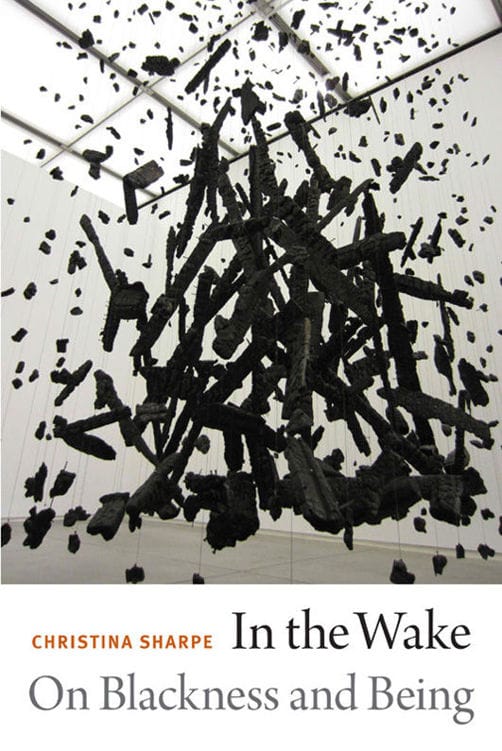
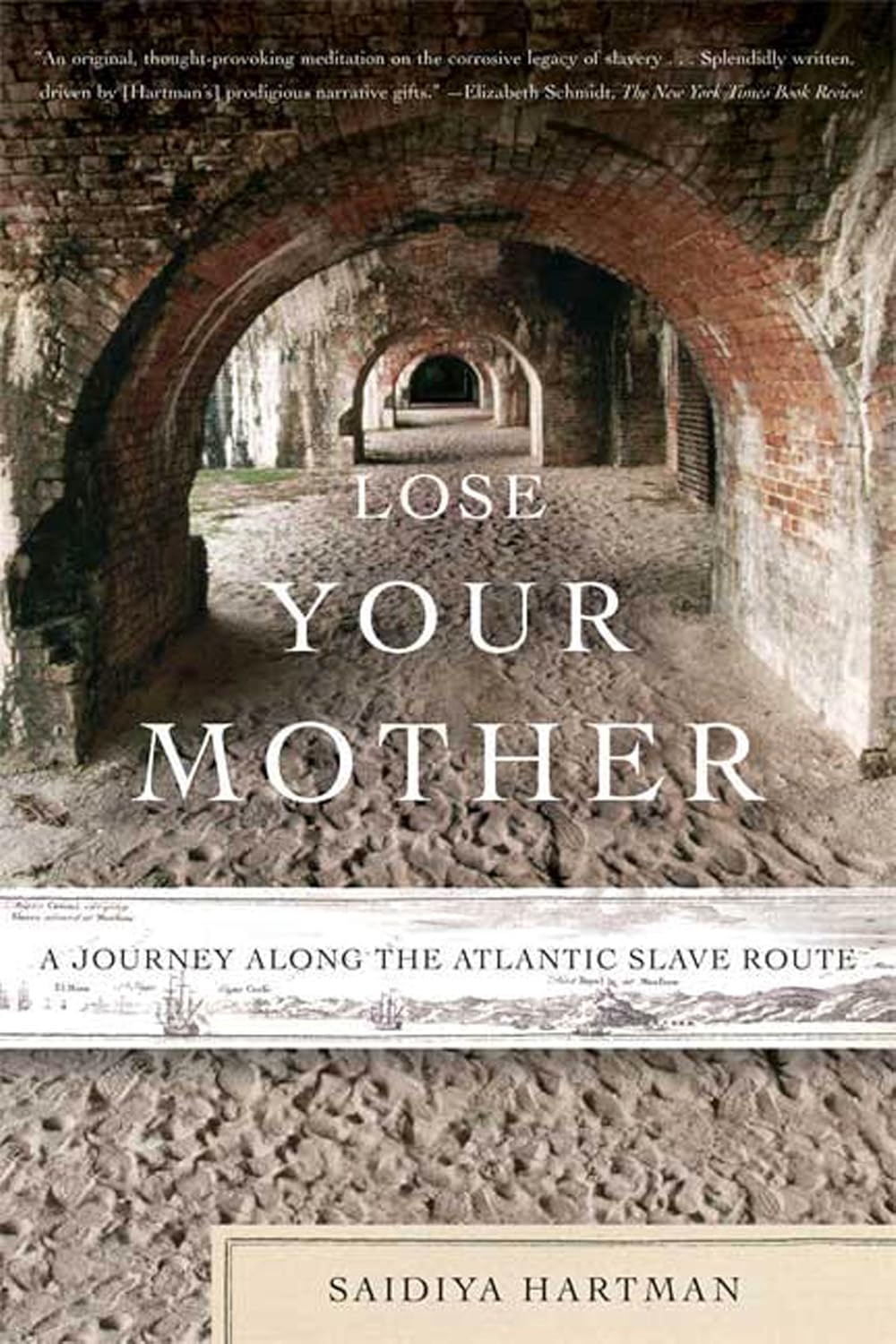
In the Wake: On Blackness and Being (2016), a book by Christina Sharpe, published by Duke University Press. Lose Your Mother: A Journey Along the Atlantic Slave Route (2008), a book by Saidiya Hartman, published by Farrar, Straus and Giroux.
Get any/all of these books wherever you get your books. Please support libraries however you can. Find out many ways to get involved in supporting libraries at Libraries for the People.
Thank you for reading.
notes
Saidiya Hartman, Lose Your Mother: A Journey Along the Atlantic Slave Route (Farrar, Straus and Giroux, Kindle Edition), 6↩︎
